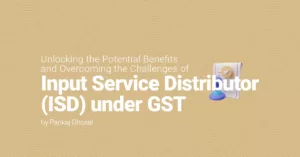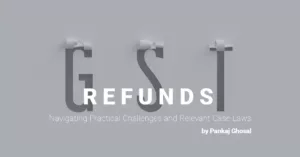How Simple Restructuring May Lead To Withdrawal Of Exemption
Written By ————
Start-ups, nowadays, are preferring a dual-company structure that involve a holding company that owns 100% of the shares in a subsidiary operating company. An operating company is the entity that enters into contractual arrangements with clients, suppliers and employees.The holding company generally houses the start-up’s intellectual property (IP), common resources like management, employees, assets, etc.
Revised guidelines that were issued in June 2021 (‘revised guidelines’), that many are still unaware of, mainly discourage the dual-company structures and joint ventures. This article talks about the potential implications and grey areas that have come into picture pursuant to such revised guidelines.
As per the guidelines dated 19 February 2019 issued by Department for Promotion of Industry and Internal Trade (‘DPIIT’), an entity is considered as a ‘start-up’ if it fulfils the following conditions:
-
Incorporated as a private limited company or registered as a partnership firm or an LLP in India.
-
Turnover of the entity for any of the financial years since incorporation/registration does not exceed INR 100 Crore.
-
Entity is working towards innovation, development or improvement of products or processes or services, or if it is a scalable business model with a high potential of employment generation or wealth creation
It is provided that an entity formed by splitting up or reconstruction of an existing business shall not be considered a ‘Start-up’. An entity shall cease to be a start-up on achieving either of the following:
-
Completion of 10 years from the date of its incorporation/ registration or
-
If its turnover for any previous year exceeds INR 100 Crore
Revised Guidelines For (De)Recognition Of Start-Up Dated 21 June 2021 (‘Revised Guidelines’)
The revised guidelines were discreetly uploaded on the Start Up India website without any notification or circular. Further to our surprise, no one is actually talking about these, even when the potential implications pursuant to these guidelines are going to cause trouble for many existing start-ups.
Revised guidelines discourage holding-subsidiary relationship and joint ventures (JVs). An extract from the revised guidelines relating to holding-subsidiary relation, JV entities incorporated outside Indian Territory is given below:
-
Holding/Subsidiary Companies will not be permitted for recognition. Any start-up becoming holding/subsidiary of any company after recognition will be derecognized.
-
Any entity formed by Joint Venture will not be recognized. Any start-up entering into any Joint Venture will be derecognized.
-
Entities incorporated outside India will be ineligible for recognition.
-
Shareholding by Indian promoters in the start-up should be at least 51%, as per Companies Act, 2013 and SEBI (ICDR) Regulations, 2018.
Impact Of Revised Guidelines
-
Surprisingly, startups having holding-subsidiary structure have been barred for recognition as start-up. This will impact start-ups that are currently following dual-company structures or one holding for many subsidiaries structure.
-
Furthermore, the revised guidelines also discourage JVs amongst start-ups. Even though we have not seen any JVs amongst the startups yet, but it may be possible to have start-ups entering into JVs for strategic reasons including synergy benefits, etc.
-
Derecognition of already recognised start-ups will impact multiple exemptions and benefits that are available for start-ups. This includes tax holiday benefit, relaxation in public procurement norms, benefit of fast-track exit, etc.
Things To Ponder Upon For Existing DPIIT-Recognised Start-Ups
-
Process of withdrawal of start-up benefits : It is unclear as to how such derecognition will take place. No procedure has been provided so far in this regard. Will it be deemed derecognition, or there will be a voluntary intimation mechanism?
-
Hardship for genuine cases : Start-up groups intentionally park their valuable assets such as cash, intangibles, etc. in one entity for different commercial reasons and operate businesses through other entities. Commercial reasons may include value consolidation in one entity, easier management of resources, etc. The revised guidelines are discouraging the genuine group structures that have been established owing to genuine commercial reasons.
-
Curious case of convertible notes : Convertible notes are one of the most common instruments issued by start-ups for raising funds. It is to be noted that only a DPIIT-registered start-up can issue convertible notes. Once the start-up gets derecognised on the stance of becoming a holding or subsidiary, how will the convertible notes be categorised? Will that lead to violation of FEMA and Companies Law since only a DPIIT-recognised start-up can issue the convertible notes?
-
Withdrawal of exemption for Income Tax purposes : Eligible startups can avail tax holiday for 3 consecutive years anytime during first 10 years of its business operations. It will be interesting to see what happens to those startups which have already availed the tax holiday benefit – will they be asked to cough up due taxes on withdrawal of startup benefits.
-
Validity of revised guidelines : Given that the revised guidelines have not been notified as a gazetted document, can they be legally challenged in the court of law is something worth exploring
Our Comments
Even though the derecognition condition of barring the holding-subsidiary structure or forming a JV is a bit too harsh, even if it were to stay as it is, it will be helpful to grandfather the startups recognised until the notification date to ensure that the existing startups do not face any unnecessary hurdles in expanding their business. Furthermore, to give effect to the derecognition, other relevant laws including companies law, foreign exchange regulations should also be synced in line with the revised guidelines.










